人教版高中英语必修一unit4 Earthquakes 单词讲解课件(共48张PPT)
文档属性
| 名称 | 人教版高中英语必修一unit4 Earthquakes 单词讲解课件(共48张PPT) |
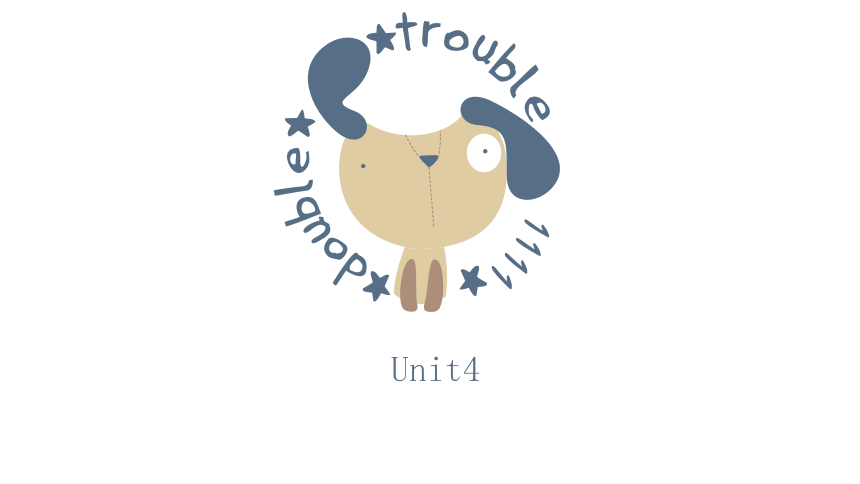
|
|
| 格式 | pptx | ||
| 文件大小 | 222.1KB | ||
| 资源类型 | 教案 | ||
| 版本资源 | 人教版(新课程标准) | ||
| 科目 | 英语 | ||
| 更新时间 | 2021-02-17 17:08:08 | ||
图片预览

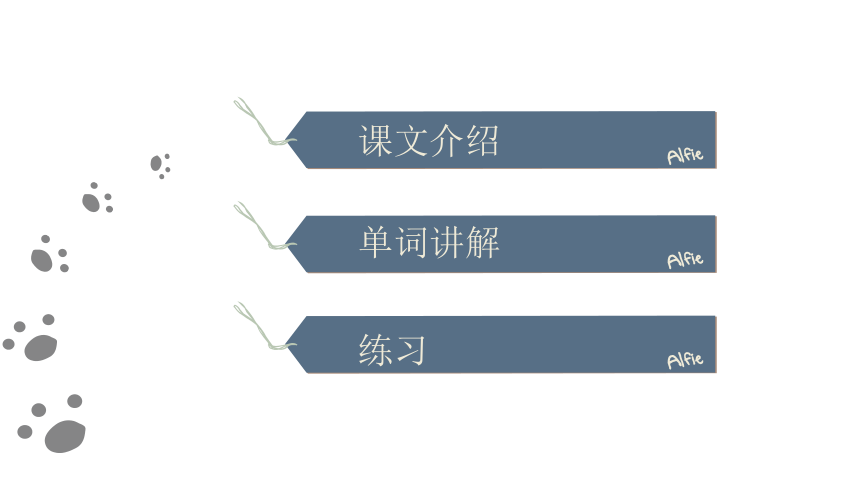

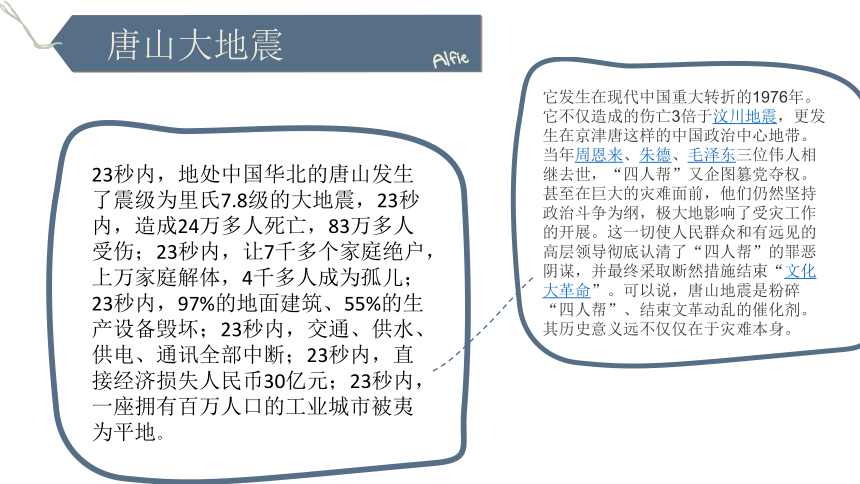

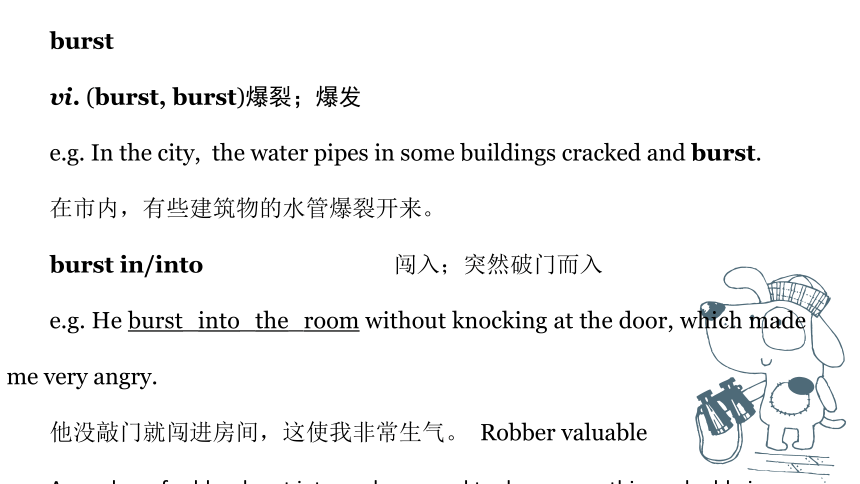
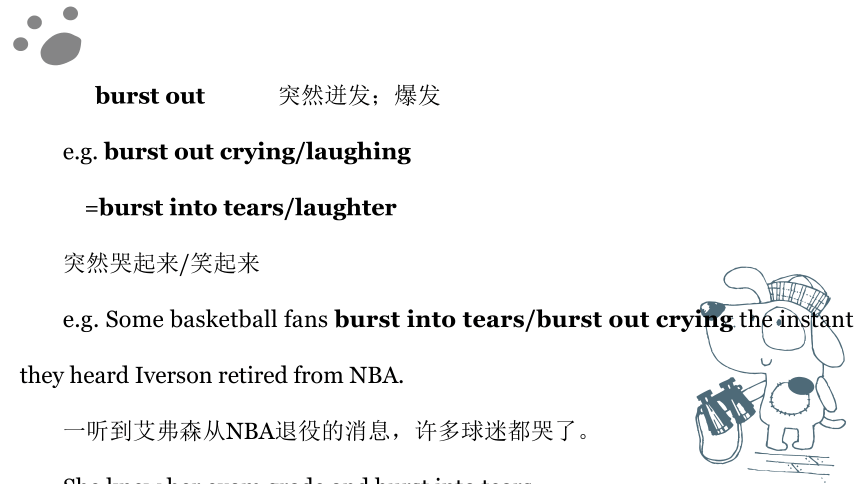
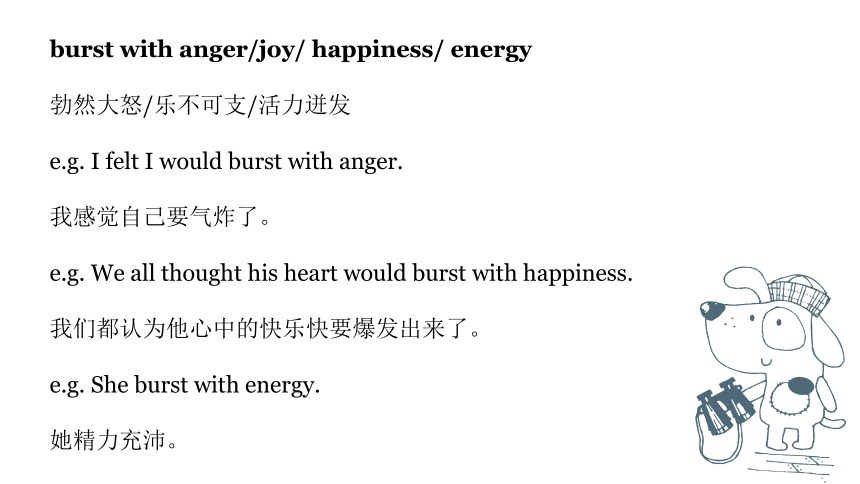
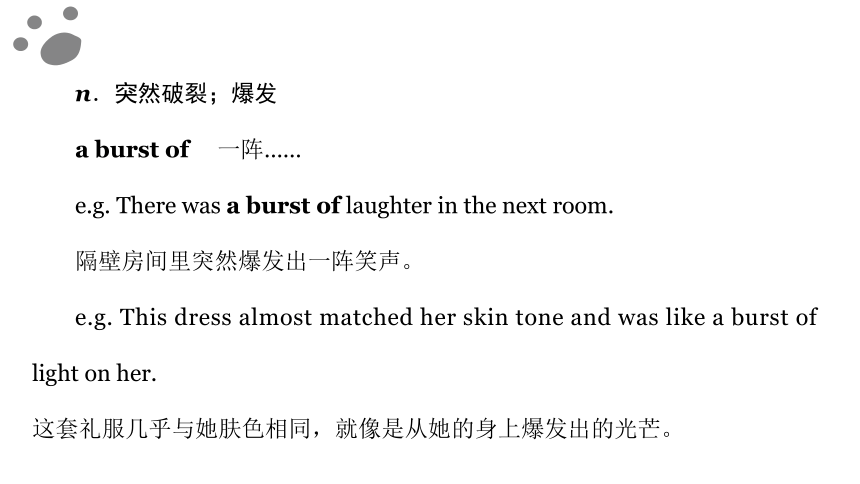
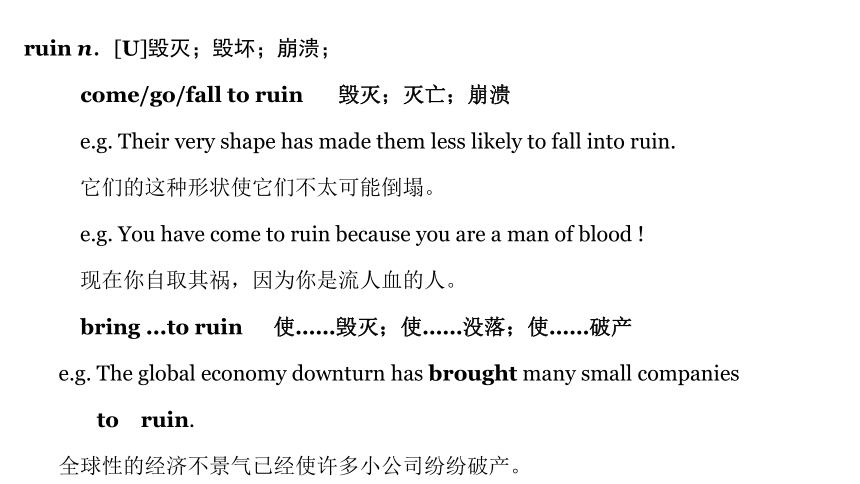
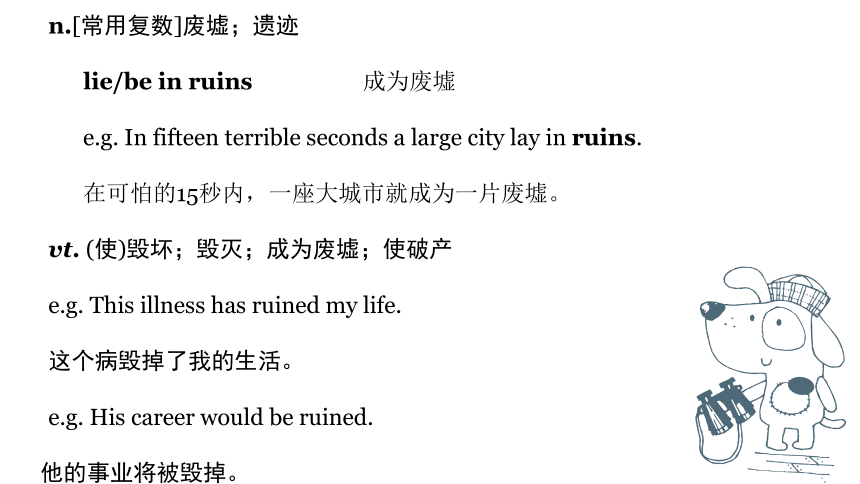
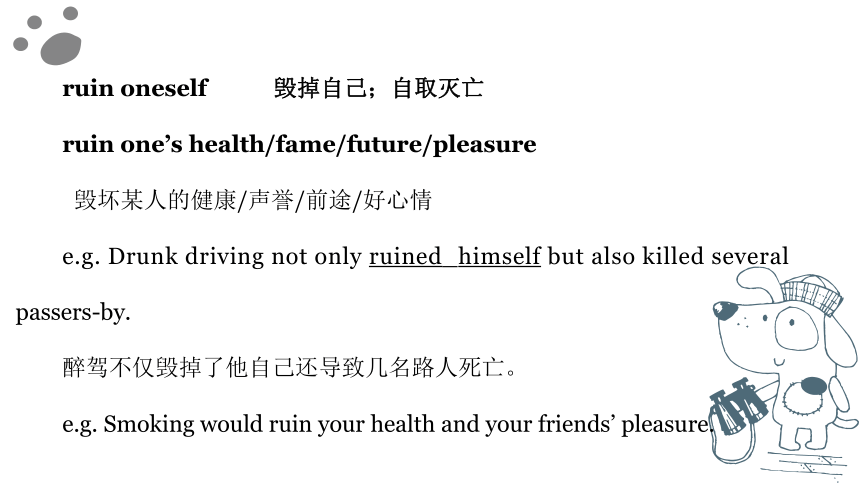
文档简介
Unit4
单词讲解
练习
课文介绍
课文朗读
23秒内,地处中国华北的唐山发生了震级为里氏7.8级的大地震,23秒内,造成24万多人死亡,83万多人受伤;23秒内,让7千多个家庭绝户,上万家庭解体,4千多人成为孤儿;23秒内,97%的地面建筑、55%的生产设备毁坏;23秒内,交通、供水、供电、通讯全部中断;23秒内,直接经济损失人民币30亿元;23秒内,一座拥有百万人口的工业城市被夷为平地。
唐山大地震
它发生在现代中国重大转折的1976年。它不仅造成的伤亡3倍于汶川地震,更发生在京津唐这样的中国政治中心地带。当年周恩来、朱德、毛泽东三位伟人相继去世,“四人帮”又企图篡党夺权。甚至在巨大的灾难面前,他们仍然坚持政治斗争为纲,极大地影响了受灾工作的开展。这一切使人民群众和有远见的高层领导彻底认清了“四人帮”的罪恶阴谋,并最终采取断然措施结束“文化大革命”。可以说,唐山地震是粉碎“四人帮”、结束文革动乱的催化剂。其历史意义远不仅仅在于灾难本身。
单词讲解
burst
vi. (burst, burst)爆裂;爆发
e.g. In the city, the water pipes in some buildings cracked and burst.
在市内,有些建筑物的水管爆裂开来。
burst in/into 闯入;突然破门而入
e.g. He burst_into_the_room without knocking at the door, which made me very angry.
他没敲门就闯进房间,这使我非常生气。 Robber valuable
A number of robber burst into my home and took away anything valuable in our home.
burst out 突然迸发;爆发
e.g. burst out crying/laughing
=burst into tears/laughter
突然哭起来/笑起来
e.g. Some basketball fans burst into tears/burst out crying the instant they heard Iverson retired from NBA.
一听到艾弗森从NBA退役的消息,许多球迷都哭了。
She knew her exam grade and burst into tears.
burst with anger/joy/ happiness/ energy
勃然大怒/乐不可支/活力迸发
e.g. I felt I would burst with anger.
我感觉自己要气炸了。
e.g. We all thought his heart would burst with happiness.
我们都认为他心中的快乐快要爆发出来了。
e.g. She burst with energy.
她精力充沛。
n.突然破裂;爆发
a burst of 一阵……
e.g. There was a burst of laughter in the next room.
隔壁房间里突然爆发出一阵笑声。
e.g. This dress almost matched her skin tone and was like a burst of light on her.
这套礼服几乎与她肤色相同,就像是从她的身上爆发出的光芒。
ruin n.[U]毁灭;毁坏;崩溃;
come/go/fall to ruin 毁灭;灭亡;崩溃
e.g. Their very shape has made them less likely to fall into ruin.
它们的这种形状使它们不太可能倒塌。
e.g. You have come to ruin because you are a man of blood !
现在你自取其祸,因为你是流人血的人。
bring ...to ruin 使……毁灭;使……没落;使……破产
e.g. The global economy downturn has brought many small companies
to ruin.
全球性的经济不景气已经使许多小公司纷纷破产。
n.[常用复数]废墟;遗迹
lie/be in ruins 成为废墟
e.g. In fifteen terrible seconds a large city lay in ruins.
在可怕的15秒内,一座大城市就成为一片废墟。
vt. (使)毁坏;毁灭;成为废墟;使破产
e.g. This illness has ruined my life.
这个病毁掉了我的生活。
e.g. His career would be ruined.
他的事业将被毁掉。
ruin oneself 毁掉自己;自取灭亡
ruin one’s health/fame/future/pleasure
毁坏某人的健康/声誉/前途/好心情
e.g. Drunk driving not only ruined_himself but also killed several passers?by.
醉驾不仅毁掉了他自己还导致几名路人死亡。
e.g. Smoking would ruin your health and your friends’ pleasure.
injure vt.损害;伤害
e.g. This could seriously injure the company’s reputation.
这会严重损害公司的声誉。
e.g. Uncontrolled high blood pressure can injure or kill you.
不受控制的高血压可伤害或置你于死地。
be badly/seriously/critically injured
e.g. Brown was seriously injured in the traffic accident, so he was in hospital.
布朗因为在交通事故中受了重伤,所以住院了。
e.g. Two ?thirds of them died or were injured during the earthquake.
他们中有2/3在地震中伤亡。
injured adj. 受伤的
e.g. an injured bird 受伤的鸟
e.g. The nurse bandaged up his injured finger.
护士包扎了他受伤的手指。
e.g. I can see injured people everywhere.
到处都能见到受伤的民众。
the injured 伤员
e.g. The moment the terrible accident happened, ambulances rushed
the_injured to the hospital.
可怕的事故一发生,救护车把受伤的人火速送到医院。
injury n. 伤;伤口;伤害
e.g. He was taken to hospital with serious head injuries.
她头部受重伤被送到医院。
e.g. Beckham has missed several games because of injury.
贝克汉姆因伤错过了几场比赛。
do sb.an injury/do an injury to sb. 伤害某人
e.g. since I was a child, my mother had told me not to do
others any injury.
?
injure
多指意外事故造成的伤害,也可指对名誉、地位的损害
e.g. The passengers were taken to hospital with minor injuries.
乘客受了轻伤,被送往医院。
e.g. One of our players has injured his leg, and will be out of the game for weeks.
我们的一名队员腿部受伤,未来几周都不能参加比赛。
wound
指人在战斗、攻击中受伤,身体上出现明显的伤口,多指枪伤、刀伤、刺伤等皮肉之伤
e.g. He died of a gunshot wound to the head.
他死于头部的枪伤。
hurt
多指精神上受到伤害,也可指身体上弄伤自己或他人的疼痛
e.g. He hurt his knee playing football.
他踢足球时伤了膝盖。
e.g. I didn’t mean to hurt your feelings .
我不是故意要伤害你的感情。
选择上述单词填空
He retired from the army because of being wounded in a fight. Soon after, he met with an accident, where he was not injured luckily but was hurted to some degree.
他因在战斗中受伤退伍了。不久他遭遇一次车祸,幸运的是他身体没有受伤,但在一定程度上心灵受了创伤。
bury vt.
(1)掩埋;埋葬;隐藏
e.g. Fifty-seven miners were buried alive .
57名矿工被活埋。
e.g. The skiers were buried under the snow.
滑雪者被埋在积雪下面。
bury one’s face in one’s hands 双手掩面
e.g. Having seen the result of the entrance exam of university, she buried her face in her hands and cried sadly.
(2)使专心;使沉浸;
e.g. After finishing my homework, I wandered into the dining room where you were buried under piles of law books.
做完作业后,我溜达进了餐厅。你正在那里忙着看你那一堆堆的法律书。
be buried in = bury oneself in 埋头于;专心于
e.g. be buried in thought 沉思
e.g. bury oneself in study 埋头研究;专心学习
e.g. Ever since he moved there, he has buried himself in/has been buried in his research work.
自从搬到那里以后,他一直专注于研究工作。
e.g. Buried_in his study, he didn’t know that all the others had left.
他埋头学习,不知道其他人都早已离开了。
表示“专心于;致力于”的短语除了be buried in外,
①be addicted to ②be absorbed in
③be devoted to ④be lost in
⑤focus on ⑥concentrate on
judge n.裁判员;法官;评判员
e.g. Your speech was heard by a group of five judges, all of whom agreed that it was the best one this year.
五个裁判听了你的演讲,他们都同意这是今年最好的。
v.断定;判断;判决
judge ...from/by ... 从……来判断
e.g.You should never judge a person by their looks.
你绝不能以貌取人。 Don’t judge a book from/by its cover.
judge between right and wrong 判断是非
e.g. As you has been an 18-year-old adult, you should be able to judge between right and wrong.
as far as I can judge 据我判断;我认为
e.g. As_far_as_I_can_judge,_ it is more likely that you will get the job.
据我判断,你更有可能获得那个工作。
judging by/from 从……上看;根据……判断
judging from/by用在句首时,为一个独立成分,不受句子主语和时态影响,只用现在分词作状语而不采用过去分词的形式。
e.g. Judging_from what you say in your letter, you don’t feel well.
根据你信中所说的判断,你感觉不太好。
right away 立刻,马上
= at once = in no time
e.g. Make these determinations right away/ at once.
立刻做出这些决定。
e.g. When the traffic accident happened, the ambulance reached at once.
asleep 睡着的;熟睡地[不用于名词前]
fall asleep 入睡
e.g. One in seven road accidents is caused by drivers falling asleep at the wheel (= falling asleep while driving ) .
七分之一的交通事故是司机驾车时睡着引起的。
sleep v. 睡;睡眠
e.g. I usually sleep on my back.
我一般仰卧着睡觉。
sleepy 犯困的
e.g. The warmth from the fire made her feel sleepy.
暖洋洋的炉火使她昏昏欲睡。
e.g. According to Chinese beliefs, people often feel more sleepy in spring.
中国人相信,人们往往会在春天感到更加困乏。
?我昨晚喝了咖啡,睡得很迟,而且我还一直睡不着,所以我现在超级困。
Last night I drank coffee and slept late. Also, I cannot fall asleep, so I am so sleepy now.
It seems that/ as if … 看来好像… ;似乎
e.g. I swore to correct my bad deeds. But it seems that mother will never trust me as before.
我向她发誓一定改正我的坏行为。 可妈妈似乎并不像以前那么相信我了。
e.g. It seems as if everyone has an opinion on reading.
如今,每一个人似乎各自都有对阅读有自己的理解。
e.g. 你看起来已经得知他的决定了。
?It seems that you have known his decision.
It seems that it was burning outside.
rescue workers 营救人员
e.g. Volunteers and rescue workers dig through what used to be an apartment building in hope of finding survivors.
志愿者和救援人员正在一个公寓楼的废墟中挖掘,希望找到幸存者。
come to one’s rescue 营救某人
e.g. Why did no one come to rescue us?
为什么没有人营救我们?=why did no one come to our rescue.
e.g. Those trapped overseas Chinese believed that armed forces(武装力量) of their motherland would come to their rescue.
shake----泛指“动摇,震动”,常指左右、上下动摇,也可以指人“震惊,颤抖” shake hand
e.g. She felt the earth shaking under him.
e.g. She was shaken with anger.
quake---- 指较强烈的震动,如地震
e.g. The building quaked on its foundation
tremble---- 指人由于寒冷、恐惧、不安等引起的身体的抖动或声音的颤抖
e.g. Suddenly I saw her lips begin to tremble and tears begin to flow down her cheeks.
shiver---- 多指寒冷引起的颤抖、哆嗦
e.g. A sudden gust of cold wind made me shiver.
be prepared for …
= make preparations for… 为…做准备
e.g. They are prepared for their wedding.
= They are making preparations for their wedding.
他们在为婚礼做着准备。
in one’s honor 向…表示敬意;为纪念
e.g. A special dinner will be held in her honour.
将举办一次特别晚宴向她致敬。
in honour of sb/sth为了表示对某人/某事物的崇敬
e.g. The stadium was named in honour of the club’s first chairman.
该体育馆以俱乐部的第一任主席命名以示纪念。
Be/ feel honored to do … 做…感到很荣幸
e.g. I felt very honoured to be included in the team.
能加入这支球队,我深感荣幸。
make /give/ deliver a speech 发言
e.g. Each child had to give a short speech to the rest of the class.
每个孩子都必须在全班同学面前作一个简短的演讲。
opening speech 开幕词
e.g. Our president made an opening speech at the sport meeting.
?
shelter庇护所
a homeless shelter 无家可归者的收容所
an animal shelter 动物收容所
give/ provide shelter to …向…提供庇护所
e.g. They provided food and shelter to those victims of the earthquake.
seek shelter from…躲避 bullet
e.g. They are seeking shelter from the storm.
他们在找躲避暴风雨的地方。
?
happen to + n./ pron. 遭遇,发生
e.g. what’s happened to you?
你怎么了?=what ’s wrong with you?
e.g. The same thing happened to me last year.
去年,同样的事在我身上发生了。
happen to do sth. 偶然;碰巧
e.g. I happened to see you in the street.
我碰巧在街上遇到你。
I happen to get 100 points.
happen ----指偶然发生
e.g. When did the accident happen? 事故什么时候发生的?
e.g. Something terrible has happened! 发生了可怕的事!
take place----指事先计划好的事情发生
The conference will take place on the 16th of June.
大会将于6月16日举行。
e.g. The competition took place on Saturday 30th June.
比赛于6月30日(星期六)举行。
语法----定语从句
概念:在复合句中,修饰名词或代词的从句叫做定语从句。
成分:先行词,即被定语从句修饰的名词或代词;
关系代词:that,which,who(宾 格为whom,所有格为whose);Mike’s
关系副词:where,when,why等。
关系代词或关系副词处在先行词和定语从句之间,起着连接主从句的作用。
关系代词that的用法
关系代词that在定语从句中既能指人,也能指物;既能做主语,也能做宾语;注意:that 在从句中作宾语可省略,作主语则不可
1)A plane is a machine(机器) that can fly. (指物,作主语)
2)The noodles (that) I cooked were delicious. (指物,作宾语)
3)Who is the man that is reading a book over there? (指人,作主语)
4)The girl (that) we saw yesterday was Jim’s sister.(指人,作宾语)
关系代词which的用法关系代词which在定语从句中只能指物,但既可以做宾语也能作主语
1)They planted 100 trees which didn’t need much water. (作主语)
2)The fish (which) we bought this morning were not fresh. (作宾语)
只能使用that,不用which的情况:
(1)先行词是all, few, little, nothing, everything, anything等不定代词时。例如:
All that he said is true.
(2)先行词被only, no, any, all,等词修饰时。例如:
He is the only foreigner that has been to that place.
(3)先行词是序数词或被序数词修饰的词。例如:
He was the second (person) that told me the secret.
(4)先行词是形容词最高级或被形容词最高级修饰的词。
This is the best book (that) I have read this year.
(5)先行词既包括人又包括物时。例如:
He talked about the people and the things that he remembered.
3. 关系代词who,whom的用法 关系代词who, whom 只能指人,在定语从句中分别作主语和宾语
1)The foreigner who helped us yesterday is from USA.(作主语)
2)The person whom you just talked to is Mr. Li. (作宾语)
4. 关系代词whose在的用法
关系代词whose为关系代词who的所有格形式,其先行词既可以是人也可以 是物,whose和它所修饰的名词在定语从句中既可以做主语也可以做宾语。
1)This is the scientist whose name is known all over the world. (指人,作 主语)
2) The room whose window faces south is mine. (指物,作主语)
3)He has written a book whose name I’ve forgotten. (指物,作宾语)
?
把下列各题的两句话合并成一个带定语从句的复合句。
1)The students will not be able to pass the English exam.
They don’t work hard enough.
2)The teacher is my physics teacher .
You saw him on the playground just now.
3) The woman is an English teacher.
She is standing at the school gate.
4) This is the girl. Her sister is a famous singer.
5) The book is good. I am reading.
完成下列句子。
Here is the knife _________________(你昨天丢失的)。
2) This is the best novel _____________________(我读过的)。
3) I have lost the dictionary ________________(我姐姐给我买的)。
4) Rice is a plant ___________________(中国南方种植的)。
5) The woman _________________________(上周六给他们做报告的)
Ⅴ 改正下列句子中的错误:
1. Mr. Brown is talking to the students who comes from Canada.
2. The factory which we are going to work in is far from here.
3. This is the room in that we lived last year.
4. They talked of things and people who they remembered in the hospital.
5. All which Iraq people want is peace.
7. This is the child who father died of SARS.
8. I have lost my pen that I like very much.
9. I went to the library but I didn’t find the book that I needed.
10. This is the person whom you are looking at/for.
单词讲解
练习
课文介绍
课文朗读
23秒内,地处中国华北的唐山发生了震级为里氏7.8级的大地震,23秒内,造成24万多人死亡,83万多人受伤;23秒内,让7千多个家庭绝户,上万家庭解体,4千多人成为孤儿;23秒内,97%的地面建筑、55%的生产设备毁坏;23秒内,交通、供水、供电、通讯全部中断;23秒内,直接经济损失人民币30亿元;23秒内,一座拥有百万人口的工业城市被夷为平地。
唐山大地震
它发生在现代中国重大转折的1976年。它不仅造成的伤亡3倍于汶川地震,更发生在京津唐这样的中国政治中心地带。当年周恩来、朱德、毛泽东三位伟人相继去世,“四人帮”又企图篡党夺权。甚至在巨大的灾难面前,他们仍然坚持政治斗争为纲,极大地影响了受灾工作的开展。这一切使人民群众和有远见的高层领导彻底认清了“四人帮”的罪恶阴谋,并最终采取断然措施结束“文化大革命”。可以说,唐山地震是粉碎“四人帮”、结束文革动乱的催化剂。其历史意义远不仅仅在于灾难本身。
单词讲解
burst
vi. (burst, burst)爆裂;爆发
e.g. In the city, the water pipes in some buildings cracked and burst.
在市内,有些建筑物的水管爆裂开来。
burst in/into 闯入;突然破门而入
e.g. He burst_into_the_room without knocking at the door, which made me very angry.
他没敲门就闯进房间,这使我非常生气。 Robber valuable
A number of robber burst into my home and took away anything valuable in our home.
burst out 突然迸发;爆发
e.g. burst out crying/laughing
=burst into tears/laughter
突然哭起来/笑起来
e.g. Some basketball fans burst into tears/burst out crying the instant they heard Iverson retired from NBA.
一听到艾弗森从NBA退役的消息,许多球迷都哭了。
She knew her exam grade and burst into tears.
burst with anger/joy/ happiness/ energy
勃然大怒/乐不可支/活力迸发
e.g. I felt I would burst with anger.
我感觉自己要气炸了。
e.g. We all thought his heart would burst with happiness.
我们都认为他心中的快乐快要爆发出来了。
e.g. She burst with energy.
她精力充沛。
n.突然破裂;爆发
a burst of 一阵……
e.g. There was a burst of laughter in the next room.
隔壁房间里突然爆发出一阵笑声。
e.g. This dress almost matched her skin tone and was like a burst of light on her.
这套礼服几乎与她肤色相同,就像是从她的身上爆发出的光芒。
ruin n.[U]毁灭;毁坏;崩溃;
come/go/fall to ruin 毁灭;灭亡;崩溃
e.g. Their very shape has made them less likely to fall into ruin.
它们的这种形状使它们不太可能倒塌。
e.g. You have come to ruin because you are a man of blood !
现在你自取其祸,因为你是流人血的人。
bring ...to ruin 使……毁灭;使……没落;使……破产
e.g. The global economy downturn has brought many small companies
to ruin.
全球性的经济不景气已经使许多小公司纷纷破产。
n.[常用复数]废墟;遗迹
lie/be in ruins 成为废墟
e.g. In fifteen terrible seconds a large city lay in ruins.
在可怕的15秒内,一座大城市就成为一片废墟。
vt. (使)毁坏;毁灭;成为废墟;使破产
e.g. This illness has ruined my life.
这个病毁掉了我的生活。
e.g. His career would be ruined.
他的事业将被毁掉。
ruin oneself 毁掉自己;自取灭亡
ruin one’s health/fame/future/pleasure
毁坏某人的健康/声誉/前途/好心情
e.g. Drunk driving not only ruined_himself but also killed several passers?by.
醉驾不仅毁掉了他自己还导致几名路人死亡。
e.g. Smoking would ruin your health and your friends’ pleasure.
injure vt.损害;伤害
e.g. This could seriously injure the company’s reputation.
这会严重损害公司的声誉。
e.g. Uncontrolled high blood pressure can injure or kill you.
不受控制的高血压可伤害或置你于死地。
be badly/seriously/critically injured
e.g. Brown was seriously injured in the traffic accident, so he was in hospital.
布朗因为在交通事故中受了重伤,所以住院了。
e.g. Two ?thirds of them died or were injured during the earthquake.
他们中有2/3在地震中伤亡。
injured adj. 受伤的
e.g. an injured bird 受伤的鸟
e.g. The nurse bandaged up his injured finger.
护士包扎了他受伤的手指。
e.g. I can see injured people everywhere.
到处都能见到受伤的民众。
the injured 伤员
e.g. The moment the terrible accident happened, ambulances rushed
the_injured to the hospital.
可怕的事故一发生,救护车把受伤的人火速送到医院。
injury n. 伤;伤口;伤害
e.g. He was taken to hospital with serious head injuries.
她头部受重伤被送到医院。
e.g. Beckham has missed several games because of injury.
贝克汉姆因伤错过了几场比赛。
do sb.an injury/do an injury to sb. 伤害某人
e.g. since I was a child, my mother had told me not to do
others any injury.
?
injure
多指意外事故造成的伤害,也可指对名誉、地位的损害
e.g. The passengers were taken to hospital with minor injuries.
乘客受了轻伤,被送往医院。
e.g. One of our players has injured his leg, and will be out of the game for weeks.
我们的一名队员腿部受伤,未来几周都不能参加比赛。
wound
指人在战斗、攻击中受伤,身体上出现明显的伤口,多指枪伤、刀伤、刺伤等皮肉之伤
e.g. He died of a gunshot wound to the head.
他死于头部的枪伤。
hurt
多指精神上受到伤害,也可指身体上弄伤自己或他人的疼痛
e.g. He hurt his knee playing football.
他踢足球时伤了膝盖。
e.g. I didn’t mean to hurt your feelings .
我不是故意要伤害你的感情。
选择上述单词填空
He retired from the army because of being wounded in a fight. Soon after, he met with an accident, where he was not injured luckily but was hurted to some degree.
他因在战斗中受伤退伍了。不久他遭遇一次车祸,幸运的是他身体没有受伤,但在一定程度上心灵受了创伤。
bury vt.
(1)掩埋;埋葬;隐藏
e.g. Fifty-seven miners were buried alive .
57名矿工被活埋。
e.g. The skiers were buried under the snow.
滑雪者被埋在积雪下面。
bury one’s face in one’s hands 双手掩面
e.g. Having seen the result of the entrance exam of university, she buried her face in her hands and cried sadly.
(2)使专心;使沉浸;
e.g. After finishing my homework, I wandered into the dining room where you were buried under piles of law books.
做完作业后,我溜达进了餐厅。你正在那里忙着看你那一堆堆的法律书。
be buried in = bury oneself in 埋头于;专心于
e.g. be buried in thought 沉思
e.g. bury oneself in study 埋头研究;专心学习
e.g. Ever since he moved there, he has buried himself in/has been buried in his research work.
自从搬到那里以后,他一直专注于研究工作。
e.g. Buried_in his study, he didn’t know that all the others had left.
他埋头学习,不知道其他人都早已离开了。
表示“专心于;致力于”的短语除了be buried in外,
①be addicted to ②be absorbed in
③be devoted to ④be lost in
⑤focus on ⑥concentrate on
judge n.裁判员;法官;评判员
e.g. Your speech was heard by a group of five judges, all of whom agreed that it was the best one this year.
五个裁判听了你的演讲,他们都同意这是今年最好的。
v.断定;判断;判决
judge ...from/by ... 从……来判断
e.g.You should never judge a person by their looks.
你绝不能以貌取人。 Don’t judge a book from/by its cover.
judge between right and wrong 判断是非
e.g. As you has been an 18-year-old adult, you should be able to judge between right and wrong.
as far as I can judge 据我判断;我认为
e.g. As_far_as_I_can_judge,_ it is more likely that you will get the job.
据我判断,你更有可能获得那个工作。
judging by/from 从……上看;根据……判断
judging from/by用在句首时,为一个独立成分,不受句子主语和时态影响,只用现在分词作状语而不采用过去分词的形式。
e.g. Judging_from what you say in your letter, you don’t feel well.
根据你信中所说的判断,你感觉不太好。
right away 立刻,马上
= at once = in no time
e.g. Make these determinations right away/ at once.
立刻做出这些决定。
e.g. When the traffic accident happened, the ambulance reached at once.
asleep 睡着的;熟睡地[不用于名词前]
fall asleep 入睡
e.g. One in seven road accidents is caused by drivers falling asleep at the wheel (= falling asleep while driving ) .
七分之一的交通事故是司机驾车时睡着引起的。
sleep v. 睡;睡眠
e.g. I usually sleep on my back.
我一般仰卧着睡觉。
sleepy 犯困的
e.g. The warmth from the fire made her feel sleepy.
暖洋洋的炉火使她昏昏欲睡。
e.g. According to Chinese beliefs, people often feel more sleepy in spring.
中国人相信,人们往往会在春天感到更加困乏。
?我昨晚喝了咖啡,睡得很迟,而且我还一直睡不着,所以我现在超级困。
Last night I drank coffee and slept late. Also, I cannot fall asleep, so I am so sleepy now.
It seems that/ as if … 看来好像… ;似乎
e.g. I swore to correct my bad deeds. But it seems that mother will never trust me as before.
我向她发誓一定改正我的坏行为。 可妈妈似乎并不像以前那么相信我了。
e.g. It seems as if everyone has an opinion on reading.
如今,每一个人似乎各自都有对阅读有自己的理解。
e.g. 你看起来已经得知他的决定了。
?It seems that you have known his decision.
It seems that it was burning outside.
rescue workers 营救人员
e.g. Volunteers and rescue workers dig through what used to be an apartment building in hope of finding survivors.
志愿者和救援人员正在一个公寓楼的废墟中挖掘,希望找到幸存者。
come to one’s rescue 营救某人
e.g. Why did no one come to rescue us?
为什么没有人营救我们?=why did no one come to our rescue.
e.g. Those trapped overseas Chinese believed that armed forces(武装力量) of their motherland would come to their rescue.
shake----泛指“动摇,震动”,常指左右、上下动摇,也可以指人“震惊,颤抖” shake hand
e.g. She felt the earth shaking under him.
e.g. She was shaken with anger.
quake---- 指较强烈的震动,如地震
e.g. The building quaked on its foundation
tremble---- 指人由于寒冷、恐惧、不安等引起的身体的抖动或声音的颤抖
e.g. Suddenly I saw her lips begin to tremble and tears begin to flow down her cheeks.
shiver---- 多指寒冷引起的颤抖、哆嗦
e.g. A sudden gust of cold wind made me shiver.
be prepared for …
= make preparations for… 为…做准备
e.g. They are prepared for their wedding.
= They are making preparations for their wedding.
他们在为婚礼做着准备。
in one’s honor 向…表示敬意;为纪念
e.g. A special dinner will be held in her honour.
将举办一次特别晚宴向她致敬。
in honour of sb/sth为了表示对某人/某事物的崇敬
e.g. The stadium was named in honour of the club’s first chairman.
该体育馆以俱乐部的第一任主席命名以示纪念。
Be/ feel honored to do … 做…感到很荣幸
e.g. I felt very honoured to be included in the team.
能加入这支球队,我深感荣幸。
make /give/ deliver a speech 发言
e.g. Each child had to give a short speech to the rest of the class.
每个孩子都必须在全班同学面前作一个简短的演讲。
opening speech 开幕词
e.g. Our president made an opening speech at the sport meeting.
?
shelter庇护所
a homeless shelter 无家可归者的收容所
an animal shelter 动物收容所
give/ provide shelter to …向…提供庇护所
e.g. They provided food and shelter to those victims of the earthquake.
seek shelter from…躲避 bullet
e.g. They are seeking shelter from the storm.
他们在找躲避暴风雨的地方。
?
happen to + n./ pron. 遭遇,发生
e.g. what’s happened to you?
你怎么了?=what ’s wrong with you?
e.g. The same thing happened to me last year.
去年,同样的事在我身上发生了。
happen to do sth. 偶然;碰巧
e.g. I happened to see you in the street.
我碰巧在街上遇到你。
I happen to get 100 points.
happen ----指偶然发生
e.g. When did the accident happen? 事故什么时候发生的?
e.g. Something terrible has happened! 发生了可怕的事!
take place----指事先计划好的事情发生
The conference will take place on the 16th of June.
大会将于6月16日举行。
e.g. The competition took place on Saturday 30th June.
比赛于6月30日(星期六)举行。
语法----定语从句
概念:在复合句中,修饰名词或代词的从句叫做定语从句。
成分:先行词,即被定语从句修饰的名词或代词;
关系代词:that,which,who(宾 格为whom,所有格为whose);Mike’s
关系副词:where,when,why等。
关系代词或关系副词处在先行词和定语从句之间,起着连接主从句的作用。
关系代词that的用法
关系代词that在定语从句中既能指人,也能指物;既能做主语,也能做宾语;注意:that 在从句中作宾语可省略,作主语则不可
1)A plane is a machine(机器) that can fly. (指物,作主语)
2)The noodles (that) I cooked were delicious. (指物,作宾语)
3)Who is the man that is reading a book over there? (指人,作主语)
4)The girl (that) we saw yesterday was Jim’s sister.(指人,作宾语)
关系代词which的用法关系代词which在定语从句中只能指物,但既可以做宾语也能作主语
1)They planted 100 trees which didn’t need much water. (作主语)
2)The fish (which) we bought this morning were not fresh. (作宾语)
只能使用that,不用which的情况:
(1)先行词是all, few, little, nothing, everything, anything等不定代词时。例如:
All that he said is true.
(2)先行词被only, no, any, all,等词修饰时。例如:
He is the only foreigner that has been to that place.
(3)先行词是序数词或被序数词修饰的词。例如:
He was the second (person) that told me the secret.
(4)先行词是形容词最高级或被形容词最高级修饰的词。
This is the best book (that) I have read this year.
(5)先行词既包括人又包括物时。例如:
He talked about the people and the things that he remembered.
3. 关系代词who,whom的用法 关系代词who, whom 只能指人,在定语从句中分别作主语和宾语
1)The foreigner who helped us yesterday is from USA.(作主语)
2)The person whom you just talked to is Mr. Li. (作宾语)
4. 关系代词whose在的用法
关系代词whose为关系代词who的所有格形式,其先行词既可以是人也可以 是物,whose和它所修饰的名词在定语从句中既可以做主语也可以做宾语。
1)This is the scientist whose name is known all over the world. (指人,作 主语)
2) The room whose window faces south is mine. (指物,作主语)
3)He has written a book whose name I’ve forgotten. (指物,作宾语)
?
把下列各题的两句话合并成一个带定语从句的复合句。
1)The students will not be able to pass the English exam.
They don’t work hard enough.
2)The teacher is my physics teacher .
You saw him on the playground just now.
3) The woman is an English teacher.
She is standing at the school gate.
4) This is the girl. Her sister is a famous singer.
5) The book is good. I am reading.
完成下列句子。
Here is the knife _________________(你昨天丢失的)。
2) This is the best novel _____________________(我读过的)。
3) I have lost the dictionary ________________(我姐姐给我买的)。
4) Rice is a plant ___________________(中国南方种植的)。
5) The woman _________________________(上周六给他们做报告的)
Ⅴ 改正下列句子中的错误:
1. Mr. Brown is talking to the students who comes from Canada.
2. The factory which we are going to work in is far from here.
3. This is the room in that we lived last year.
4. They talked of things and people who they remembered in the hospital.
5. All which Iraq people want is peace.
7. This is the child who father died of SARS.
8. I have lost my pen that I like very much.
9. I went to the library but I didn’t find the book that I needed.
10. This is the person whom you are looking at/for.
